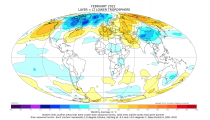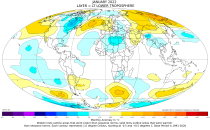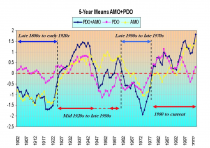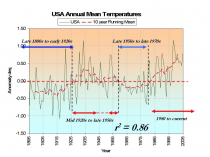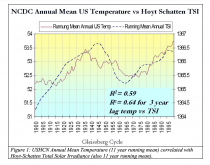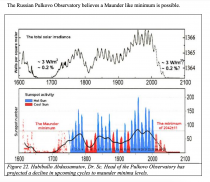Madhav Khandekar, Ray Garnett
Note: Update from UAH on February global lower tropospheric temperatures:
And January 2022:
February Temperatures (preliminary)
Global composite temp.:+0.00F equal to seasonal average
Northern Hemisphere:+0.02F above seasonal average
Southern Hemisphere:-0.04 F below seasonal average
Tropics: -0.43F below seasonal average
------------
In an earlier commentary, Madhav Khandekar pointed out that the year 2018 was one of the coldest and snowiest winters in Canada, especially in western Canada. For example, Calgary witnessed one of the largest snowfalls in recorded history, and Edmonton witnessed 127 consecutive days with below freezing temperatures. In Atlantic Canada, several snowstorms were recorded with snow falls amounting to 10 to 25 cms. Khandekar also pointed out extreme cold weather in Europe during late February 2018 with Moscow reporting 45 cm of snow and temperatures of at least -17C, and France shivering at below freezing temperatures between February 26 and 28.
Fast forward to last Christmas, when bitterly cold weather with wind-chill values of -50C and lower over much of western Canada. Since the new year 2022, we are in the throes of another dose of extreme cold weather from Vancouver to St. John’s, and even to the southeast USA to Greece and Turkey, to Japan, and northeast China.
Over North America, brutal and dangerous snowstorms made two visits in the first week of week of February producing dangerous winter conditions from Nova Scotia, Illinois, and Texas with power outages for over half a million residences. Surface transportation was disrupted in many US Midwest States, and over 6000 flights were cancelled on February 4th.
Even the tropical regions of northern India were not spared from brutally cold weather, where over 200 people died, most of the dead were elderly living in poorly built houses with no insulation or any heating system, unlike we have here in Canada.
What is annoying is that environmentalists and climate scientists (pundits?) keep talking about GW (Global Warming_ and the possibility of extreme heat, floods, and droughts. There is almost no mention of increases in cold extremes either in the climate science community or in the major news media. Climate activists keep talking about Climate Catastrophe or Climate Emergency with more extreme warm weather in future due to human-added CO₂. Many global leaders and multi-national Corporations have become members of the “net-zero by 2050” campaign, urging nations to limit C0₂ emissions to keep the earth’s mean temperature from rising beyond 1.5C. A warmer climate could precipitate a Climate Crisis In their minds.
What is the climate reality?
Based on the latest satellite data (Figure 1) the global mean temperature variation for January 2022 is a mere +0.03C above the 40-year average. A close analysis suggests that the earth’s climate may be cooling not warming. Observational evidence over many areas of the world definitely points to a cooling climate.
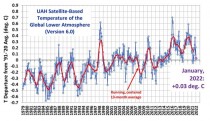
Figure 1. Running Average and January 2022 Average Temperatures
(Courtesy of Roy Spencer)
Has the climate stopped warming? There are many more issues with the hype about GW that needs to be assessed carefully. Unfortunately, the Canadian media and climate science community continues to push Global Warming that totally disregards the reality of the present trends
Figure 2 shows one M km2 (2%) increase in Northern Hemispheric (N.H.) snow cover from 1980 to 2021. Five of the 15 years since 2007 have been above the 42-year average. There is no evidence of the disappearing snow cover and milder winters that the IPPC predicted.
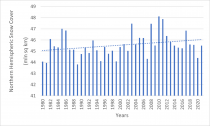
Figure 2. Winter N.H. snow cover extent 1980-2021
Source: Rutgers University Snow Lab
It is worth noting that the spike in N.H. snow cover in 2010 and 2011 coincided with the deepest solar minimum since 1913. The four years from 2007 to 2010 there were fewer than 15 sunspots a month.
On February 7th 2022, the Electroverse website describes how France is bracing for blackouts where old coal fire generating facilities are being fired up to cope the dropping temperatures. The website also reports that this has been Japan’s snowiest winter, and that scores of people have died in New Delhi. India’s cold wave has brought its first snowfall since 1958.
Finally, the important issue of a Climate Catastrophe thinking continues to gather steam with the “net-zero by 2050” theme. The obvious question for world leaders and the climate science community is: Is there a Climate Catastrophe?
There are many other important issues in the climate change science to be addressed but unfortunately they are not on the world’s agenda..
We close with photographs of extreme cold events from around the world courtesy of Electroverse (see www.electroverse.net).
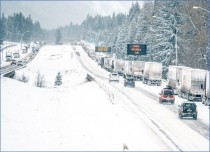
Jan. 6, 2022 Record-breaking snowstorms snarl transport across U.S. shutter the federal government and bring Washington D.C to a standstill with close to 12 inches of snow.

Jan. 21, 2022 Nashville, Tennessee, U.S. experiencing snowiest January since 1985.
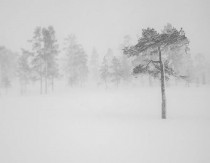
Jan. 24, 2022 Heavy snow in Athens, Greece
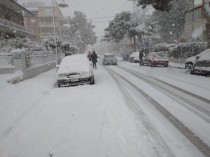
Jan. 24, 2022 Heavy snow in Athens, Greece
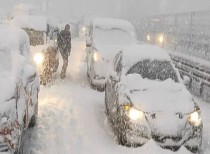
Jan. 25, 2022 Istanbul, Turkey
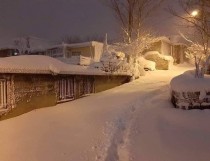
Jan. 18, 2022 Erbil, Iraq, reports -15C
References
IPCC 2007: Climate Change 2007: The Physical science basis: Contribution to the Working Group 1 to the fourth assessment report of the IPCC: Edited by S Solomon et al, Cambridge University Press,
Khandekar, M.L. and Garnett E.R. 2020 Global Warming (GW) & Extreme Weather (EW) Link: Are Cold Weather Extremes on the Rise? Earth & Environmental Science & Reviews ISSN: 2639-7455.
About authors
Madhav Khandekar holds a Ph D in Meteorology from the Florida State University USA (1968) and an M. Sc. in Statistics from Pune University India (1957). Khandekar has been working in weather and climate science for over 60 years and has published over 150 papers, reports, book reviews, and scientific commentaries. His current interest is global weather anomalies and extremes. He retired as a Research Scientist at Environment Canada in 1997 and lives in Toronto.
Ray Garnett has worked in Agro-Climatology for 45 years as an independent consultant and research analyst at the Canadian Wheat Board’s Weather and Planning Departments. Along with Dr. M.L. Khanderkar he co-founded the ad hoc Long-Range Weather and Crop Forecasting Working Group that organized meetings across Canada. In 2016 he was awarded the Andrew Thompson prize in Applied Meteorology given out by the Canadian Meteorological and Oceanography Society.
-----------
ICECAP NOTE:
We are at a point where the long term cycles of temperatures and the real drivers, solar and ocean factors should kick us into a cold multi-decadal mode. The Russian Academy believes the sun is likely to enter a deep minimum like the Dalton or even Maunder Minimum.
We had a preview in the harsh winters of 2013/14 and 2014/15. Weatherbell provided EIA of forecasts that Heating Degree Days would be 11% above normal (which verified) while the government forecasted normal. See the summary here. 2014/15 was the coldest and snowiest since 1717!



